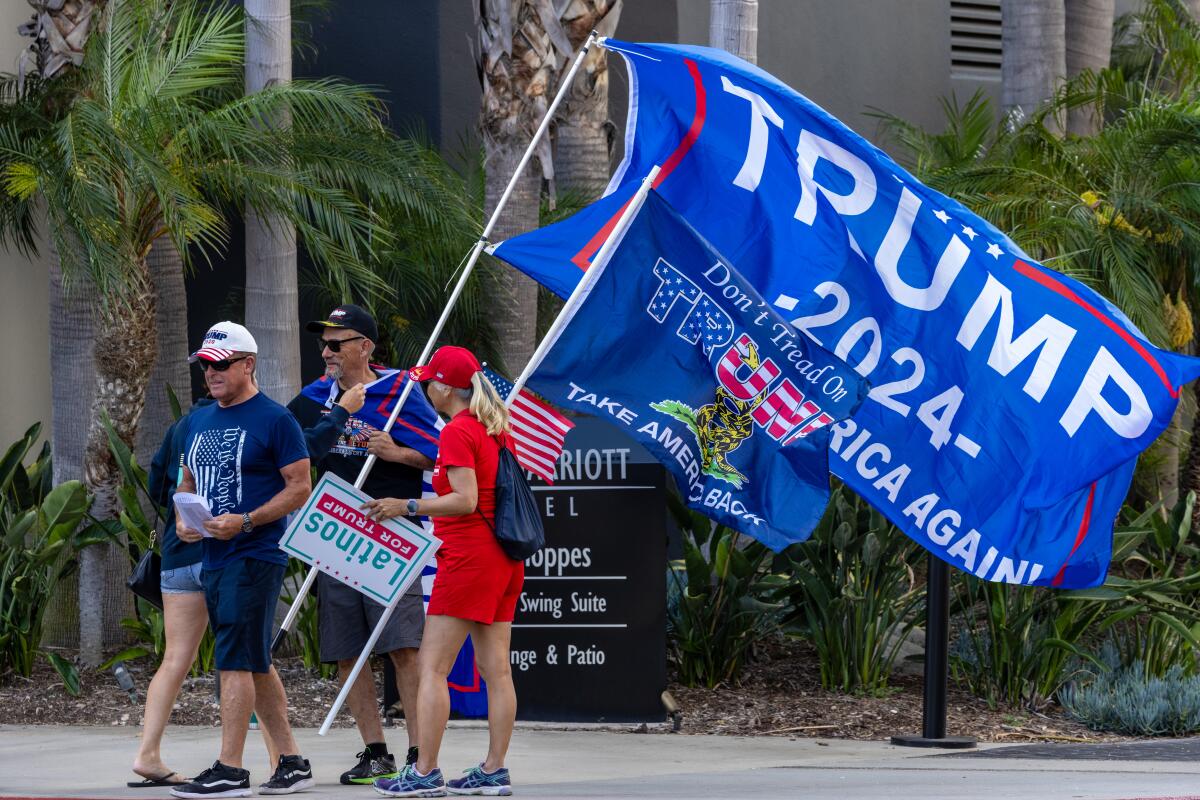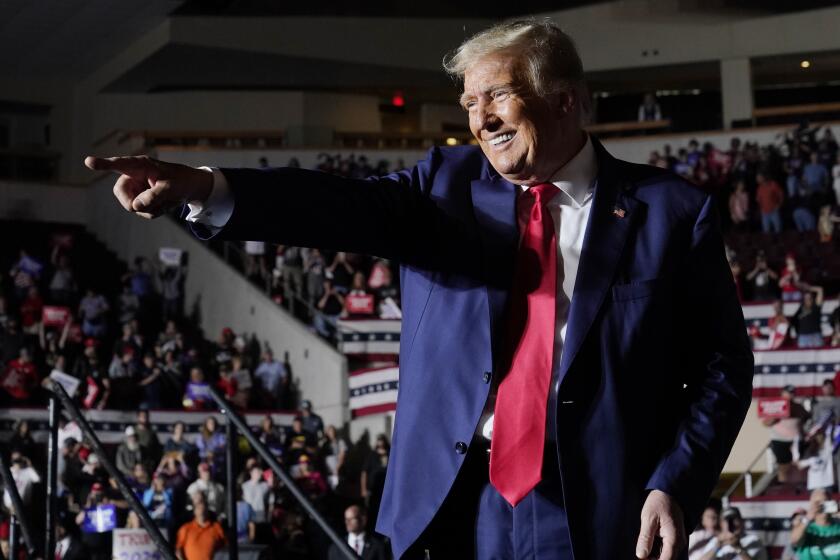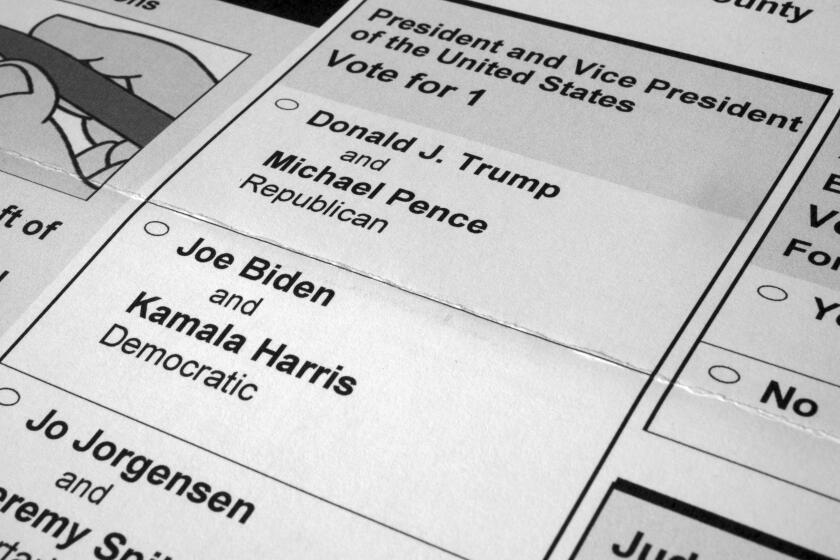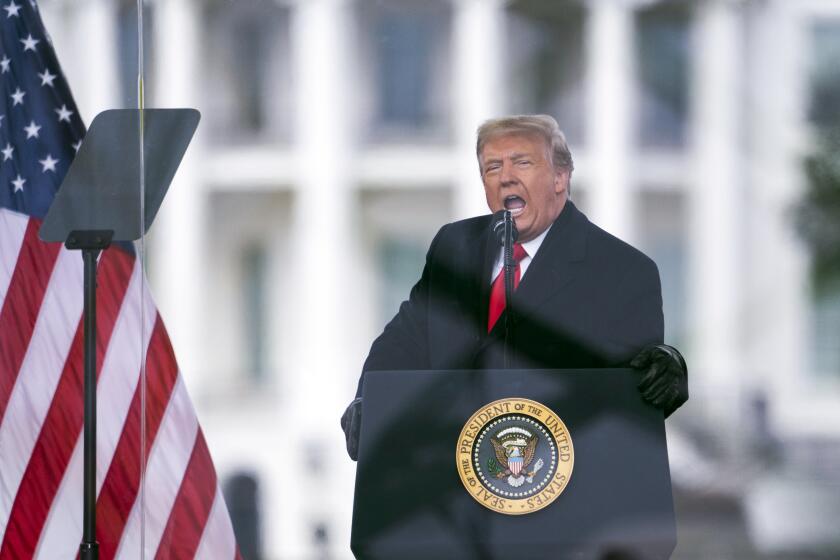Trump team changes obscure GOP rules in hopes of clinching presidential nomination early

- Share via
Strategic, surgical efforts by former President Trump’s campaign to overhaul obscure Republican Party rules in states around the nation, including California, have created an opportunity for the GOP front-runner to quickly sew up his party’s presidential nomination.
The former president’s aides have sculpted rules in dozens of states, starting even before his 2020 reelection bid. Their work is ongoing: In addition to California, state Republican parties in Nevada and Michigan have recently overhauled their rules in ways clearly designed to favor Trump.
This election, “despite a large number of candidates, only the Trump campaign went out and did the really hard grunt work of talking to state parties to try and get them to meld their rules to Donald Trump’s favor,” said Ben Ginsberg, a veteran GOP attorney who represented the presidential campaigns of George W. Bush — notably during the 2000 Florida recount — and Mitt Romney.
The Trump campaign succeeded in changing the rules “in part because they knew what they were doing and in part because everyone else is asleep at the switch,” Ginsberg added.
The changes could discourage campaigning and decrease voter participation, said Dan Lee, a political science professor at the University of Nevada, Las Vegas.
“There’s all this uncertainty, and there hasn’t been much campaigning going on in Nevada. I think that’s due to that uncertainty,” Lee said.
The success of the Trump campaign’s effort is partly attributable to his aggressive courting of state GOP leaders. The former president has headlined fundraisers that have raised millions of dollars for state parties. He wooed their leaders at the White House when he was president and has feted them at his Mar-a-Lago resort in Florida since leaving office.
“It’s sort of an advantage no one else is going to naturally have,” said Clayton Henson, a member of the Trump campaign’s political team who worked on political affairs at the White House during the former president’s tenure.
The Trump campaign’s rule changes have focused on ensuring he benefits from how all-important delegates are awarded after each state caucus or primary.
New state GOP presidential primary rules for 2024 are likely to help Trump win California delegates and make the state less competitive for other Republicans.
Though much of the media attention in presidential campaigns focuses on polling, particularly in early-voting states, the outcome is ultimately determined by delegates chosen in each state. The wonky quilt of rules determining how delegates are awarded to candidates vary across the 50 states, Washington, D.C., and the U.S. territories. Each will send delegates to the Republican National Convention in Milwaukee next summer, when the party will formally pick its nominee.
“The way delegate-selection rules are written by each state party every four years can make a huge difference to individual candidates and how many delegates they get,” Ginsberg said.
Trump’s success in changing the rules ahead of 2024 marks a complete reversal from his first presidential campaign, he added. “The Trump campaign in 2016 was five guys on a pirate ship who did not have the organization to go out and really work the rules.”
Trump’s 2024 campaign started working on shaping delegate-allocation rules in November, seeking modifications that were beneficial for the state parties as well as the campaign, Henson said.
“Parties are extremely keen on being more important in the primary and that’s why we’re seeing more winner-take-all rules … and seeing more early primaries or caucuses when they have the opportunity,” Henson said. “What that amounts to is a front-runner set of rules, something that benefits the front-runner, and delegates being allocated quickly.”
But the work started in earnest years ago — changes were made in 30 states and territories in 2019, according to Josh Putnam, a political scientist who focuses on the presidential nomination process and runs FrontloadingHQ. Among the rules changes were switching from proportional delegate allocation, where multiple candidates can win delegates in a state, to winner-take-all. In some states, delegates are also being awarded based on the outcome of party-run caucuses among GOP activists, many of whom remain loyal to Trump, rather than official state primary elections.
“The Trump team was unusually active in nudging state parties toward changes for 2020 that 1) made it easier for Trump to gobble up delegates as the nomination process moved through the calendar of contests and 2) made it much more difficult for multiple candidates to win delegates,” he wrote in March.
In the 2024 race, opinion polls show that the former president enjoys a commanding lead in the race for the GOP nomination. A UC Berkeley survey co-sponsored by the Los Angeles Times released earlier this month found Trump has the support of about 55% of likely California Republican voters, compared with 16% for his top challenger, Florida Gov. Ron DeSantis. If Trump can maintain that level of support in California’s March primary, he will win all of the state’s 169 delegates — the most of any state in the nation and about 14% of what a candidate needs to win the GOP nomination.
A UC Berkeley/L.A. Times poll finds Republicans strongly favor Trump in California’s 2024 primary, though voters are concerned about his and Biden’s vulnerabilities.
DeSantis backers said they focused on courting voters rather than trying to modify state party protocols.
“The effort we put into delegate rules is almost zero,” said Ken Cuccinelli, founder of the pro-DeSantis Never Back Down super PAC. “It’s one/10,000th of what we do. But talking to voters is a big part of what we do.”
He added that the Trump campaign is focused on delegate rules because it recognizes that DeSantis is the most formidable threat to the former president’s candidacy.
“He knows who his challenger is — it’s Ron DeSantis. This is effectively a two-person race. It’s why they’ve spent tens of millions of dollars attacking DeSantis,” Cuccinelli said. “DeSantis still has the highest favorables in the race. It’s why they’re playing the delegate rule games. We’re not doing that. We’re playing defense there, but we’re not trying to rig the rules. We’re trying to keep them from being rigged.”
That said, decisions to change the delegate-allocation process in California, Nevada and elsewhere prompted the DeSantis super PAC to reduce its efforts in those states. The group’s supporters had already knocked on about 130,000 doors in California.
“This was a huge factor in our decision. We started door-knocking with the expectation that the rules would remain consistent in California,” Cuccinelli said.
He said they would not have started their efforts in the state if they knew the state GOP would shift its rules from ones that rewarded grassroots campaigning to ones that give the edge to campaigns that bombard the airwaves: “We met a lot of voters, we answered a lot of questions one-on-one.”
Campaigns in both parties have long tried to work party rules to benefit their candidates, sometimes resulting in confusing outcomes — a candidate can win a state primary or caucus but his or her rival can collect more of its delegates.
Donald Trump should never hold office again. But the way to send him to permanent exile is a thrashing at the polls, not kicking him off the 2024 ballot as some Democrats would like.
In 2008, Hillary Clinton beat Barack Obama in the Nevada vote 51% to 45%, but Obama won one more of the state’s delegates because of how they are awarded based on regional caucuses around the state — a game-changing moment in the campaign, said Bill Burton, who was Obama’s national press secretary at the time.
“It was a dog fight,” he said. “If Hillary was able to pull off a real victory there, it could have been real trouble for us in terms of momentum. But because it was a split decision and we won more delegates, she didn’t get the boost she could have.”
As a novice candidate in 2016, Trump had a similar experience as Clinton. He won Louisiana, yet Sen. Ted Cruz (R-Texas) was awarded more of the state’s delegates — an example of his team being outflanked by Cruz’s campaign, whose strategists understood the intricacies of the state’s nomination process.
“In 2016, the Trump campaign did not have an appreciation early on for the importance of actual delegates,” said Ron Nehring, a national spokesman and California chairman for the Cruz campaign who is also a former leader of the state GOP. “Part way through 2016, Trump said the process was rigged. What he was whining about was that the Cruz people absolutely outmaneuvered him in states where Trump won the primary.”
Ultimately, the delegate hunt was moot because Trump won so much support from GOP voters and Cruz dropped out. But Nehring said the former president clearly learned from that experience, given his current campaign’s successful efforts to change state party rules across the country in a manner “that blatantly favors Trump over other candidates.”
It’s an effort that he argues is grossly inappropriate.
“Changing the rules once the campaign has begun and changing the rules based on the political conditions of the race — that’s why it’s unfair,” said Nehring, who is not aligned with a 2024 presidential candidate.
Others argue that the Trump campaign is doing what campaigns have historically always done, such as working existing delegate rules as former Texas Rep. Ron Paul’s ardent supporters did in the 2012 presidential campaign. Although former Massachusetts Gov. Mitt Romney had effectively clinched the party nomination, Paul’s backers worked arcane party rules to take over GOP delegations across the nation.
For example, while Paul finished a distant third in the Iowa caucuses, 23 of the state’s 28 delegates who went to the nominating convention were Paul supporters who were not bound to support the victor of the state’s first-in-the-nation voting contest.
National Republicans fought back, raising the number of states required to put a name in contention and allowing campaigns to select state delegates.
Incumbent presidents have also often reshaped the rules, as Trump did before the last presidential election.
“He and his team laid the groundwork for this in 2020. They were active in turning the knob on making it really front-runner friendly in how the rules were crafted,” Putnam said.
Several of Trump’s top advisors in the 2024 campaign, including Chris LaCivita, are deeply versed in the intricacies of winning delegates.
“There’s an understanding from the senior campaign staff that this is how it’s done,” LaCivita said. “The president made it clear he wants an organization, he wants an organized, efficient campaign that is built around ensuring that some of the unknowns that they faced in ’16 are not faced this time.”
LaCivitia said the former president’s campaign has focused on advocating for winner-take-all delegate rules that benefit a front-runner, and if that’s not possible, proportional delegate allocation based on statewide vote tallies. They also pushed for caucuses, which draw the most committed conservative voters, rather than primaries in some states. And they supported rules requiring delegates to support the candidate who won in their state, cutting down on convention uncertainty.
They have had a number of successes: Nevada will award all of its delegates based on the results of a Feb. 8 in-person caucus, two days after a meaningless all-mail state primary — an uncommon scenario. The primary may be canceled if no candidate files to appear on the ballot, and there is talk of the state party not allowing any candidate who appears on the ballot to compete in the caucus. Michigan will allocate most of its delegates through caucuses on March 2 rather than the state’s primary on Feb. 27. Colorado and Louisiana are considering revamping their rules so delegates are bound to a candidate during a second round of voting if no candidate receives a majority during the first round.
Operatives in California, Nevada and elsewhere say they were forced to change their rules to align with national Republican Party requirements, which include mandating some proportional delegate allocation opportunities in states where contests take place before March 15. Though they claim these modifications do not benefit any candidate, most political experts are skeptical, partly because the leaders of many of these groups are Trump loyalists.
In California, the state GOP voted in late July to award all of their 169 delegates to a candidate who receives more than 50% of the vote in the March primary, and to allocate them proportionally based on the statewide vote if no candidate clears that benchmark. The state previously awarded them by congressional district, theoretically allowing candidates to target certain regions without having to advertise across a state that contains some of the most expensive media markets in the nation.
The change is largely viewed as making the state less competitive for candidates who can’t afford to blanket the airwaves before California and 14 other states vote on March 5, Super Tuesday.
Similar lawsuits, arguing that the 14th Amendment disqualifies Donald Trump because of his Jan. 6 role, are expected to be filed across the nation.
However, some argue this rule change may have created additional risk for Trump if he falters before then.
“If they’re coasting to the nomination, then the old rules would have served them fine, but now, if they stumble, they probably don’t take as many delegates as they likely would have under the old rules,” said Rob Stutzman, a veteran GOP strategist who does not support Trump.
This presidential election is unlikely to be like any other. Trump has been indicted over his alleged efforts to overturn the 2020 presidential election, his handling of confidential government documents after leaving the White House and his payments to an adult film star during the 2016 campaign in an attempt to conceal their affair.
A judge recently set March 4 — one day before Super Tuesday — as the start of the federal trial over his efforts to stop the transfer of power after his 2020 election loss and his role in the Jan. 6 insurrection at the U.S. Capitol.
Conservative grassroots activists also hope to upend the California rule change at the state party’s convention on Oct. 1 — a Herculean task because of the two-thirds vote required to make such a modification.
While DeSantis backers say they are not behind the insurgent effort to overturn the new delegate-allocation plan, they are angry about the former president’s meddling in state party rules.
“If Trump is going to keep breaking these rules in ways that just move everything away from grassroots campaigning, that means voters are going to have less and less contact with candidates. That’s exactly the opposite of what ordinary Americans want,” Cuccinelli said. “So this is Trump versus the little people. He can’t pull it off in every state, but he pulled it off in California.”
More to Read
Get the L.A. Times Politics newsletter
Deeply reported insights into legislation, politics and policy from Sacramento, Washington and beyond. In your inbox twice per week.
You may occasionally receive promotional content from the Los Angeles Times.














